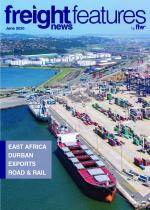The Trans Africa Railway Corporation (TARC) has big plans to build some 24 000km of high-speed rail in Sub-Saharan Africa.Christian Roman Gutzwiller, CEO of TARC in Ghana, said this was only the first phase of its project and more rail networks were on the cards in the second and third phases of the plan.“TARC’s high-speed railway (HSR) construction during the first phase will connect Dakar in Senegal in West Africa to Addis Ababa in Ethiopia in East Africa,” he said.
“During this phase a railway connection down from Djibouti in the north to Cape Town in South Africa and then up to Lagos in Nigeria will also be constructed. There will also be a second East-West connection in between.”According to Gutzwiller it was a big bang solution for Africa. “It is a very new and unprecedented approach,” he said.
“The goal is to construct all 24 000km simultaneously in each country by 2025.”Admitting that it was a highly complex project considering the number of stakeholders involved and the fact that it involved several countries in Africa with very different jurisdictions and infrastructure capability, Gutzwiller said there was no reason why it could not be done.“Africa is ready for a rail solution of this kind. In many regions studies for railway projects have already been done. They might very well not be in line with this programme, but we believe the time is right to now open discussion with every country involved as well as the African Union and the various regional economic communities.”In the second phase, from 2026 to 2030, the plan is to connect Africa from Dakar to Europe via rail and to Asia from Djibouti.
Phase 3, planned for 2030 to 2035, is a railway connecting Dakar to Djibouti as well as a connection between the two east to west railway lines. This would allow for a complete railway solution for the Democratic Republic of the Congo (DRC).Gutzwiller said to date all the strategic goals had been met, including the introduction of the project and the outlining of the way forward.“We hope to have commitment from the African Union and the RECs by no later than October this year.”
Delivering such a project would be a mammoth task, said Duncan Bonnett, a director at Africa House. “There is no denying that these types of projects are great ideas, but it would require a phased approach and tapping into what is already there in many countries.”He said one of the biggest stumbling blocks in Sub-Saharan rail network development sat slap-bang in the middle of the continent. “That is the DRC. It just does not tick all the boxes for railway projects. Not only are you struggling with internal connectivity here – whether it is road or rail – but it is essentially four countries in one. It is a very difficult and complex landscape in which to negotiate projects.”Many of the neighbouring countries were also fairly unstable. “The existing rail network in the DRC is connected to some of the other regional networks already, but it is not particularly effective.” Another issue was that rail developments were often only considered if there was some kind of anchor project to justify their existence.
Bonnett said getting past these kinds of challenges was probably the biggest issue facing transcontinental railway developers. “And there are no easy answers. I believe one has to first increase capacity at domestic level followed by sub-regional level before one can even think about a continental level integration.”

